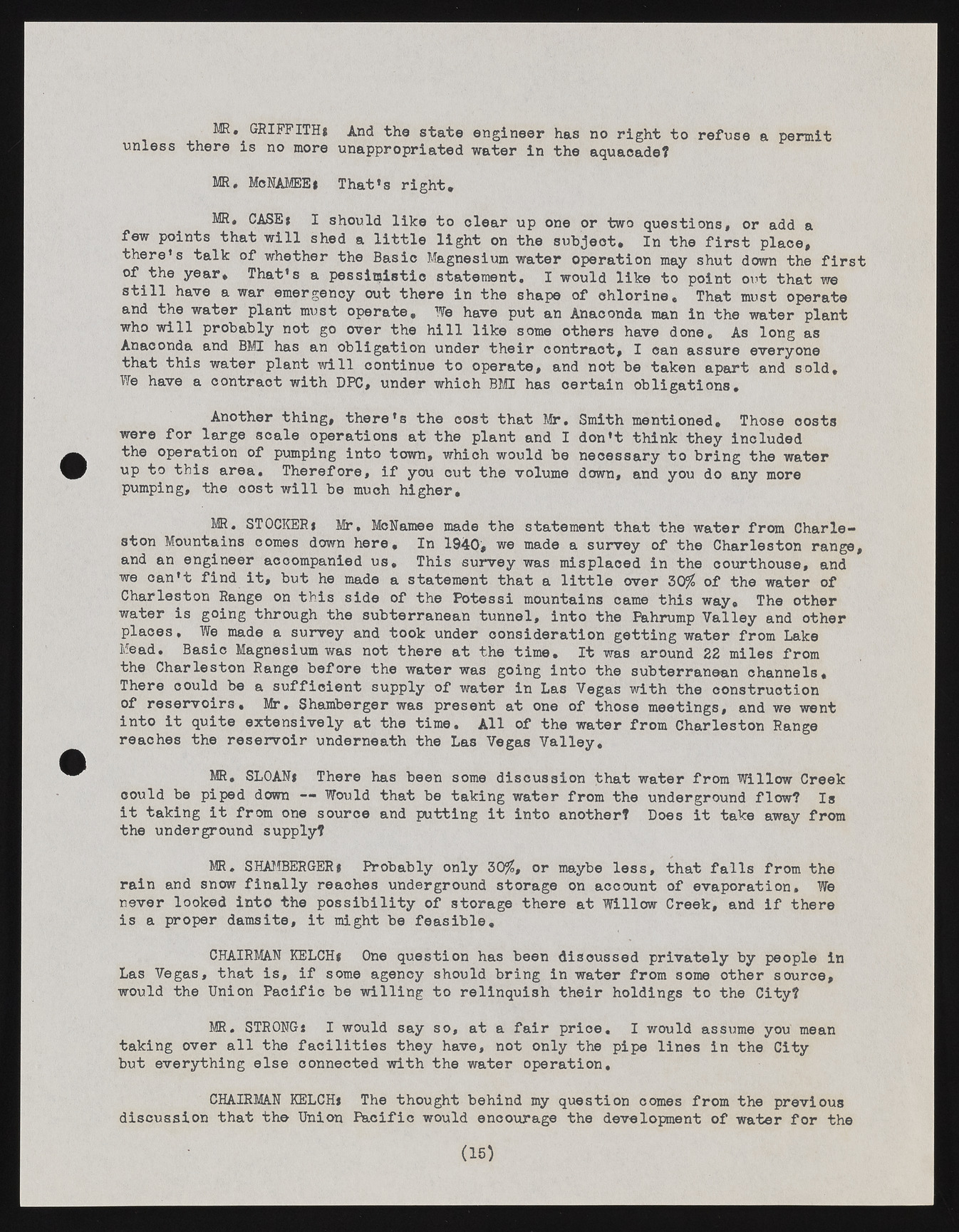Copyright & Fair-use Agreement
UNLV Special Collections provides copies of materials to facilitate private study, scholarship, or research. Material not in the public domain may be used according to fair use of copyrighted materials as defined by copyright law. Please cite us.
Please note that UNLV may not own the copyright to these materials and cannot provide permission to publish or distribute materials when UNLV is not the copyright holder. The user is solely responsible for determining the copyright status of materials and obtaining permission to use material from the copyright holder and for determining whether any permissions relating to any other rights are necessary for the intended use, and for obtaining all required permissions beyond that allowed by fair use.
Read more about our reproduction and use policy.
I agree.Information
Digital ID
Permalink
Details
Member of
More Info
Rights
Digital Provenance
Publisher
Transcription
MR. GRIFFITH* And the state engineer has no right to refuse a permit unless there is no more unappropriated water in the aquacade? MR* MeNAMBE* That's rig h t. MR. CASE* I should like to clear up one or two questions, or add a few points that w ill shed a l i t t l e lig h t on the subject. In the f i r s t place, there's talk o f whether the Basic Magnesium water operation may shut down the f i r s t of the year. That’ s a pessim istic statement. I would like to point out that we s t i l l have a war emergency out there in the shape of chlorine. That must operate and the water plant must operate. We have put an Anaconda man in the water plant who w ill probably not go over the h i ll like some others have done. As long as Anaconda and BMI has an obligation under th eir contract, I can assure everyone that this water plant w ill continue to operate, and not be taken apart and sold. We have a contract with DPC, under which BMI has oertain obligations. Another thing, there’ s the cost that Mr. Smith mentioned. Those costs were for large scale operations at the plant and I don’ t think they included the operation of pumping into town, whioh would be necessary to bring the water up to this area. Therefore, i f you cut the volume down, and you do any more pumping, the oost w ill be much higher. MR. STOCKER* Mr, McNamee made the statement that the water from Charleston Mountains comes down here. In 1940* we made a survey of the Charleston range, and an engineer accompanied us. This survey was misplaced in the courthouse, and we can 't find i t , but he made a statement that a l i t t l e over 30% o f the water of Charleston Range on th is side of the Potessi mountains came this way. The other water is going through the subterranean tunnel, into the Fhhrump Valley and other places. We made a survey and took under consideration getting water from Lake Mead. Basic Magnesium was not there at the time. It was around 22 miles from the Charleston Range before the water was going into the subterranean channels* There could be a su fficie n t supply of water in Las Vegas with the construction of reservoirs, Mr, Shamberger was present at one of those meetings, and we went in to i t quite extensively at the time. A ll of the water from Charleston Range reaches the reservoir underneath the Las Vegas V alley, MR. SLOAN* There has been some discussion that water from Willow Creek could be piped down — Would that be taking water from the underground flow? Is i t taking i t from one source and putting i t into another? Does i t take away from the underground supply? MR. SHAMBERGER* Probably only 30%, or maybe le ss, that fa lls from the rain and snow fin a lly reaches underground storage on account of evaporation, We never looked in to the p o s s ib ility of storage there at Willow Creek, and i f there is a proper damsite, it might be fe a sib le . CHAIRMAN KELCH* One question has been discussed privately by people in Las Vegas, that is , i f some agency should bring in water from some other source, would the Union P acific be w illin g to relinquish their holdings to the City? MR. STRONG* I would say so, at a fa ir price, I would assume you mean taking over a ll the fa c ilit ie s they have, not only the pipe lines in the City but everything else connected with the water operation, CHAIRMAN KELCH* The thought behind my question comes from the previous discussion that the Union P acific would encourage the development o f water fo r the (15)

